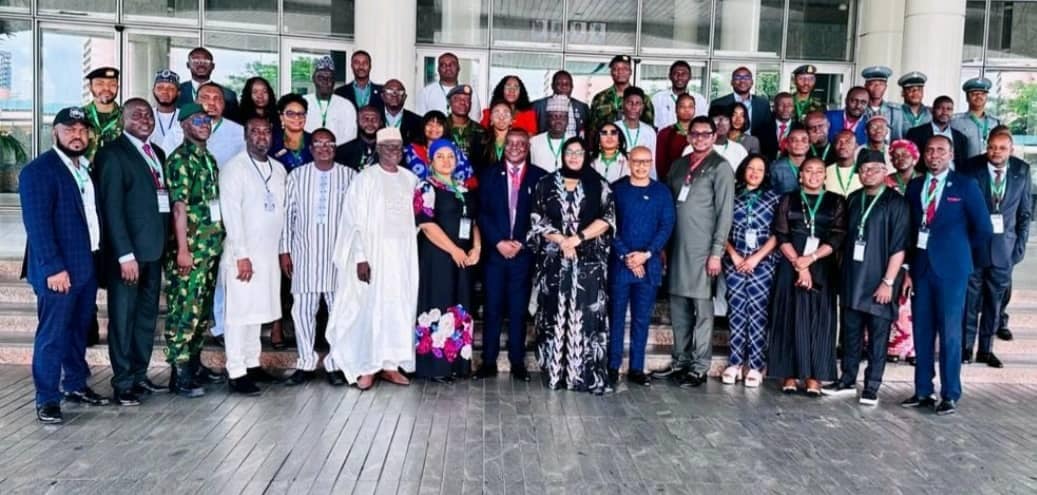•From Afrocentrism to 4-D Diplomacy: Nigeria’s foreign policy in focus
The 2nd edition of the Foreign Policy School (FPS 2.0) delved into reshaping Nigeria’s global standing, amplifying the call for a pivotal shift from historical Afrocentrism to a more globally relevant foreign policy strategy. The programme underscored the need for citizen-centric diplomacy, advocating the Tinubu Doctrine’s 4-D Diplomacy and emphasising the crucial role of well-trained diplomats beyond foreign affairs. In this report, Senator Iroegbu, who is also one of the participants, highlighted the key takeaways including diplomatic recalibration, a focus on clear guidelines and professionalism, and recommendations for structured approaches, continuous training, and assertive foreign policy. FPS through this training seeks to position Nigeria strategically in the ever-evolving landscape of international relations.
Reflections from FPS 2.0
Africa’s central position in Nigerian foreign policy, established during the 1960s, is now under scrutiny as calls for a more modern and globally relevant strategy gain momentum. While acknowledging past successes, the 2nd edition of the Foreign Policy School (FPS 2.0) scrutinized the need for recalibration, urging a shift toward a “whole society” approach. Notably, former President Goodluck Jonathan accentuated the importance of skilled diplomats across government agencies, highlighting aviation and investment.
While recognising the achievements of Nigeria’s existing concentric approach, especially in peacekeeping and democratic governance across Africa, participants at the FPS 2.0 underscored the necessity for a citizen-centric strategy aligned with current geopolitical dynamics. The recently introduced Tinubu Doctrine, encapsulated in the 4-D Diplomacy (Democracy, Demography, Development, and Diaspora), represents a strategic shift toward intentional, dynamic, and value-driven foreign relations. Speakers also highlighted the significance of clear guidelines for non-career diplomats and the imperative role of well-trained diplomats in pursuing national goals.
Accordingly, the stakeholders unanimously supported a citizen-focused and citizen-enabled strategy, stressing the crucial roles of diplomacy and professionalism. The Director General of the NIIA, Prof. Eghosa Osaghae, highlighted the pivotal role of diplomacy in international relations, emphasising continuous training and appointing individuals ideally suited for their roles. On his part, Gen. Martin Luther Agwai (rtd) applauded FPS 2.0 for narrowing the gap between career and non-career diplomats, stressing the importance of diverse voices in diplomacy. More insights from key figures further stressed on the historical context of Nigeria’s foreign policy, rooted in multilateralism and global trade. The call for a sustained embrace of multilateralism was supported by the Director-General/Chief Trade Negotiator, NOTN, Amb. Fred Agah, and other speakers, who urged for a change in Nigeria’s narrative toward trade and negotiation. The event also emphasised the importance of diplomacy in defining national ideals, and values, and fostering international friendships.
The FPS 2 concluded with recommendations for structured guidelines, continuous training, and a strategic approach to appointing diplomats. By implementing these suggestions, Nigeria aims to enhance its diplomatic efforts and promote a stronger global presence. Ultimately, school reinforced the significance of diplomacy and citizen diplomacy in shaping Nigeria’s role in Africa and the world.
Afrocentrism and the quest for foreign policy evolution
“Africa as the centerpiece of Nigerian foreign policy,” a narrative ingrained since the 1960s, is now facing critical evaluation amid the evolving landscape of global affairs. Originated in response to decolonization efforts during Nigeria’s independence, there’s a compelling contemporary argument that this concept has become outdated, diverging significantly from the trajectory of a modern state aspiring to be globally relevant and esteemed among nations. Successful modern foreign policy objectives, they contend, must prioritise citizens and be shaped by domestic considerations, the behaviour of other states, and plans for specific geopolitical designs reflecting national interests, values, and citizens’ well-being. This reevaluation challenges the enduring Nigeria-Africa-centric foreign relations strategy, conceived in 1960-61.
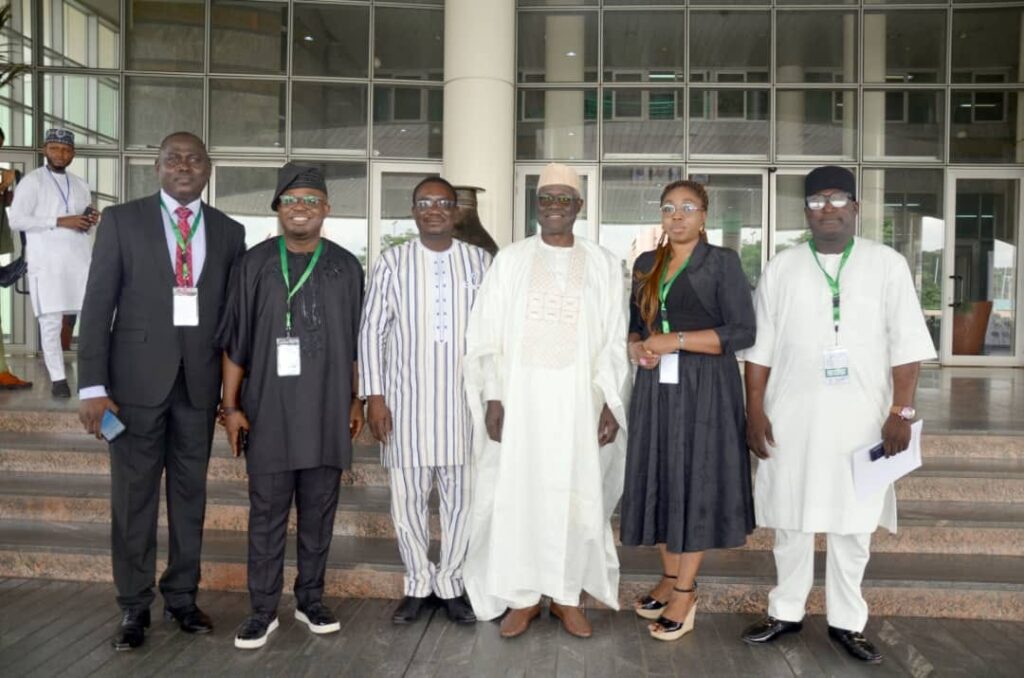
Yet, a counterargument has emerged, acknowledging the need for recalibration but refusing to dismiss key successes of Nigeria’s concentric approach. Notably, achievements in peacekeeping, Peace Support Operations (PSO), and sustaining democratic governance in African nations were highlighted, underscoring stability achievements in Liberia, Sierra Leone, Guinea Bissau, Ivory Coast, The Gambia, and others. To this end, the FPS 2.0, hosted by the Nigerian Institute for International Affairs (NIIA) and the Peacebuilding Development Consult (PBDC) from September 25 to 28 at the Ministry of Foreign Affairs, Abuja, became the stage where these narratives converged. The initiative brought together participants from various sectors, including security agencies, foreign affairs, the academia, media, and civil society. The Chief Executive Officer of PBDC, Mr. Kayode Bolaji, noted that the overarching goal was to foster a deeper understanding of diplomacy’s role in shaping Nigeria’s global engagement and promoting citizen diplomacy, both across Africa and worldwide.
At FPS 2.0, a consensus emerged among speakers, participants, and stakeholders that Nigeria must embrace a “whole society” approach to foreign policy where citizens, government and non-government officials, and career and non-career diplomats play their parts. Former President Goodluck Jonathan articulated this need, emphasising the significance of well-versed diplomats extending beyond foreign affairs, particularly benefiting government agencies such as Aviation and the Ministry of Trade and Investment in dealings with international trade, foreign relations, and migration.
“Certain government agencies, such as Aviation and the Ministry of Trade and Investment, particularly benefit from individuals well-versed in diplomacy when dealing with foreign airlines and international trade,” he said.
There is no doubt that Nigeria’s historical adherence to a concentric foreign policy, centering around Afrocentrism since independence, has undergone scrutiny in recent years due to evolving realities, shifts in Nigeria’s status, and changing relations with the international community. While the Yar’Adua-Jonathan Administration introduced “Citizens Diplomacy” to prioritise Nigerian citizens in foreign relations, this approach faced a slowdown in recent years under President Muhammadu Buhari. However, some of the gaps were filled by the Nigeria Diaspora Commission (NIDCOM), albeit with controversies.
Nevertheless, the current President Ahmed Tinubu administration has signaled a more intentional approach to foreign policy by unveiling the ‘4-D Diplomacy’. Spearheaded by the Nigerian Ministry of Foreign Affairs under Amb. Yusuf Maitama Tuggar’s leadership, this transformative approach seeks to review Nigeria’s global engagement strategy. Comprising Democracy, Demography, Development, and Diaspora, the 4-D Diplomacy, acknowledged and known as the ‘Tinubu Doctrine,’ represents a strategic shift toward intentional, dynamic, and value-driven foreign relations. This doctrine asserts that Nigeria’s foreign policy must align with national interests, uphold democratic values, harness demographic potential, stimulate economic development, and prioritise the well-being of its diaspora community.
Addressing “Emerging Realities in Foreign Affairs. Diplomacy, Military Power, and Political Power,” Permanent Secretary Ministry of Foreign Affairs, Mr. Adamu Ibrahim Lamuwa, represented by Amb. Alexander Tobi Ajayi traces the transmutations in Nigeria’s foreign policy from the 1960s to the present. “Ranging from Sir Tafawa Balewa’s progressivism of the 1960s to the Murtala/Obasanjo’s African dynamism of the 1970s, the Babangida’s economic diplomacy of the 1980/early 1990s, the Obasanjo’s investment-oriented foreign policy of 2000s, the Yar’Adua/Goodluck Jonathan’s Citizens centered diplomacy of the late and second half of 2000 and to the present Tinubu’s Doctrine of 4-Ds Foreign Policy Concepts of Democracy, Development, Demography and Diaspora,” he stated. Despite these apparent transitions, Lamuwa noted the enduring fundamentals of Nigeria’s foreign policy based on concentric circles, reacting to developments in immediate neighbors, the ECOWAS sub-region, Africa, and the global world.
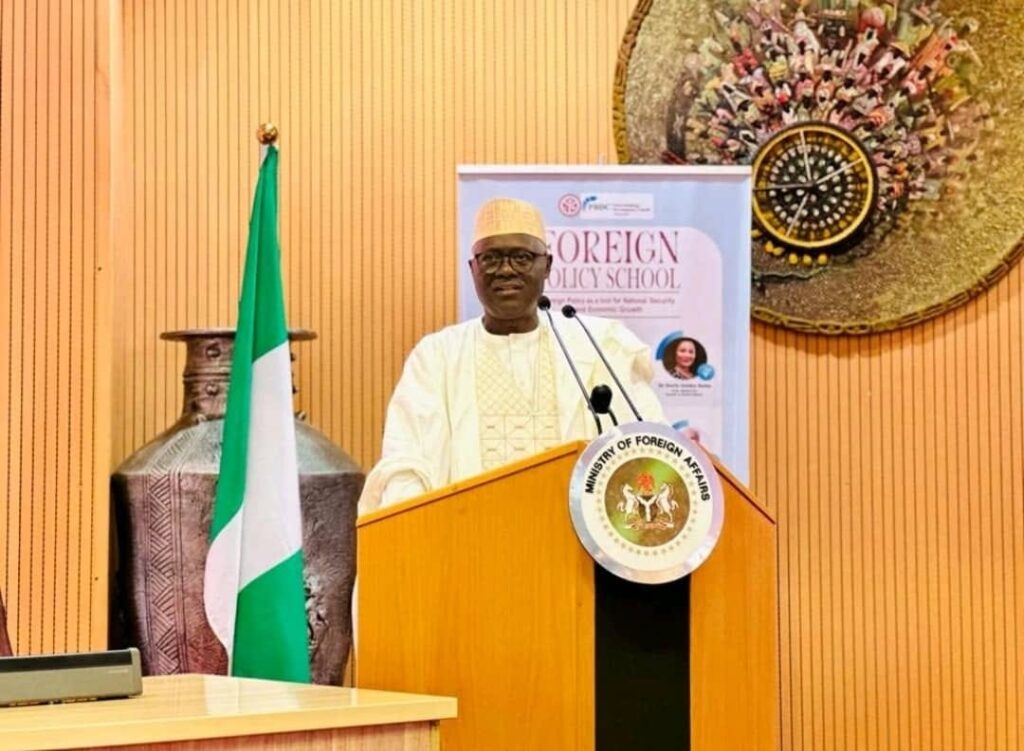
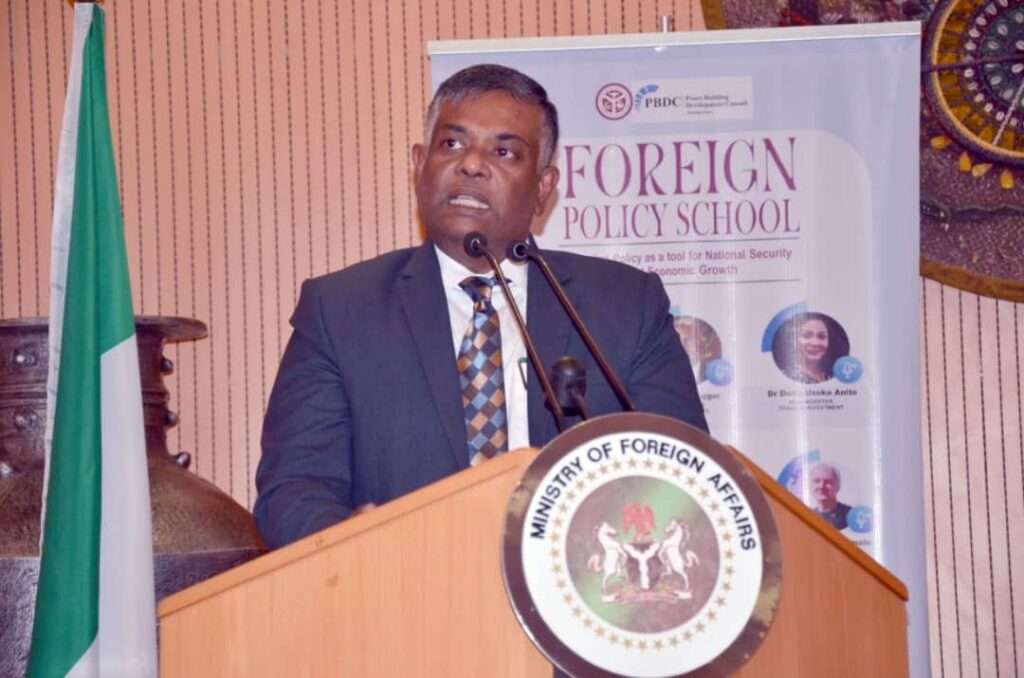
L-R: Gen. Martin Luther Agwai (rtd); and High Commissioner of India to Nigeria, Benin, and ECOWAS, Amb. Shri G. Balasubramanian
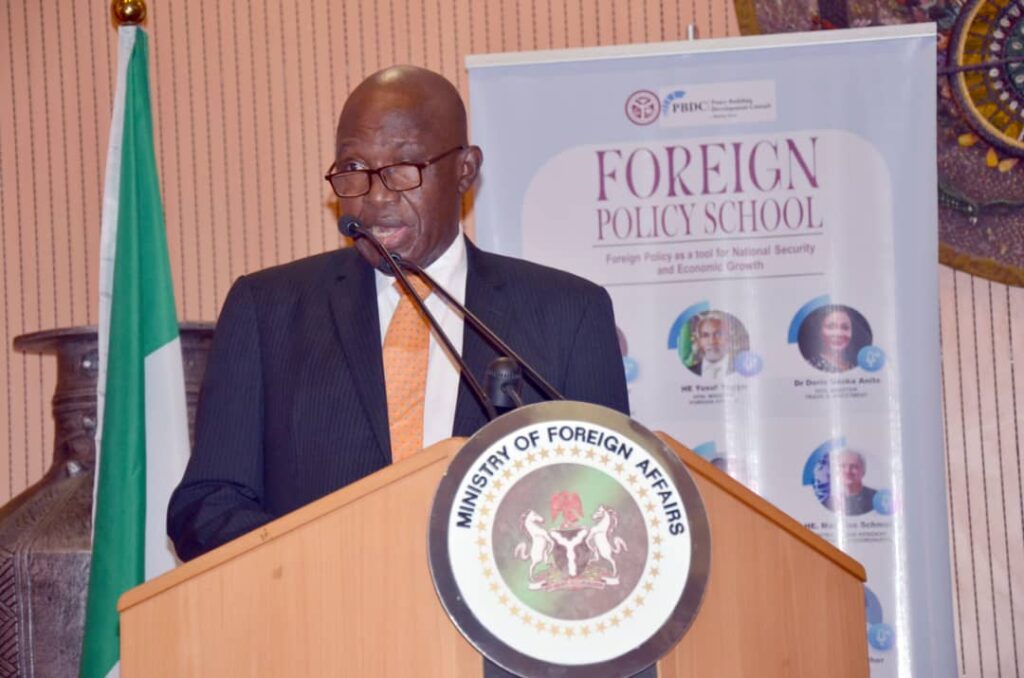
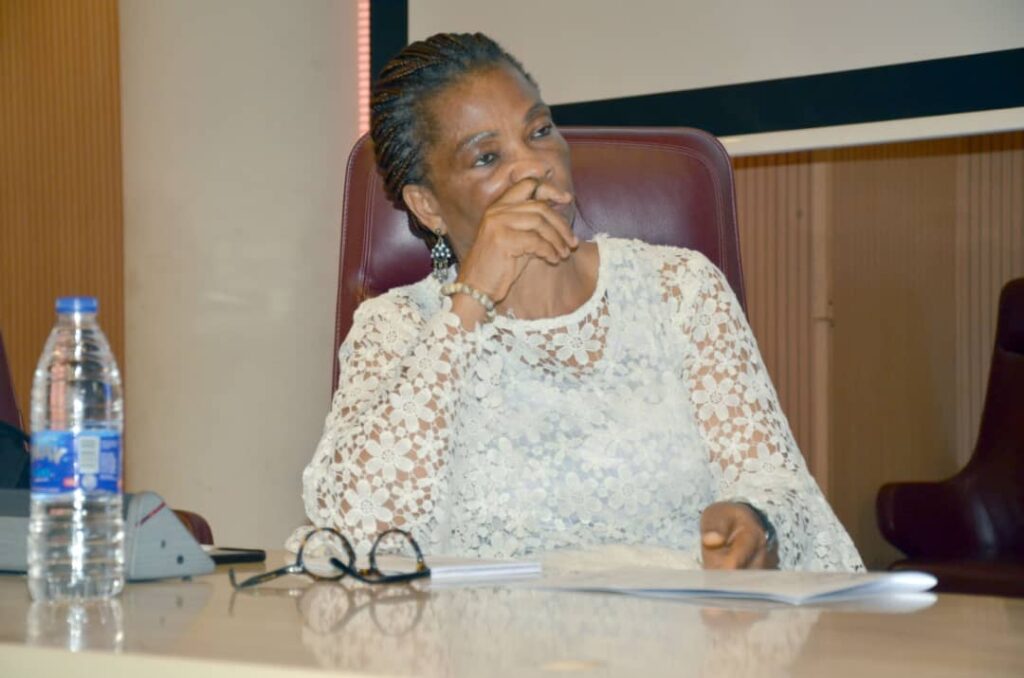
L-R: Director-General/Chief Trade Negotiator, Nigerian Office for Trade Negotiations (NOTN), Amb. Fred Agah; and former Nigerian Ambassador to Ethiopia and Permanent Representative to the African Union, Amb. Nkoyo Toyo
Stakeholders were of the opinion that this juncture marks a critical period for Nigeria, urging thoughtful recalibration while recognizing the merits of past approaches. Even as the nation navigates evolving global dynamics, the call for a comprehensive and citizen-centric foreign policy strategy echoed through the corridors of FPS 2.0, setting the stage for the evolution of Nigeria’s diplomatic footprint.
Professional and citizen-centric approach to Nigeria’s foreign policy
Stakeholders unanimously underscored the necessity for a citizen-focused and citizen-enabled strategy, asserting that the collective efforts of citizens, both in public and private spheres, academia, and civil society, significantly contribute to advancing a country’s foreign policy objectives. They highlighted the pivotal roles of diplomacy and professionalism, defining a nation’s stance on international relations, trade, defence, and global cooperation. Foreign policy objectives encompass promoting national interests, ensuring security, fostering economic relationships, and championing a country’s values on the world stage, addressing issues ranging from trade agreements to global challenges like conflict, climate change, and humanitarian crises.
In his opening remarks, former President Jonathan underlined the critical role of diplomacy in safeguarding national interests. He advocated for experienced diplomats to lead key Ministries, Departments, and Agencies (MDAs), citing their potential to enhance efficiency and effectiveness, ultimately aiding the nation in achieving its goals.
Jonathan further stressed the need for clear guidelines in appointing non-career diplomats, asserting that such guidelines would ensure the selection of the most qualified representatives rather than political appointees. Discussing diplomats’ length of service, he suggested rewarding successful diplomats with longer tenures, recognising their critical roles in realising the nation’s global objectives.
“Foreign policy and diplomacy are centered on safeguarding our nation’s interests, necessitating skilled diplomats. Clear guidelines for appointing non-career diplomats are crucial, as we must focus not only on career diplomats but also on those outside traditional paths. The caliber of diplomats deployed is of utmost significance, as diplomacy is the art of identifying and steadfastly pursuing our goals,” he noted.
In the same vein, the Ambassador of Burkina Faso to Nigeria, Amb. Paschal Gouba, asserted that the training session was an opportunity for the participants to deepen their knowledge of foreign policy to be better equipped to face the major challenges of contemporary international geopolitics and geostrategy. According to Gouba, “Africa needs executives, particularly well-trained diplomats who are most importantly aware of the international context and the very interests of our countries”.
He continued: “This training will undoubtedly equip our executives for them to effectively take on their missions consisting in implementing the foreign policy of our countries. The rich topics of the training sessions will provide the participants with useful and pertinent information in the field of international relations, foreign policy, international trade, and negotiation, and will strengthen their capacities in formulating policies that reflect the interests of their countries.’
“With foreign policy, our states must seek to respond to the attitude of other international actors and, more generally, to act in the international environment to preserve it when favorable to us and change it when contrary to our interests.”
Photospeak:
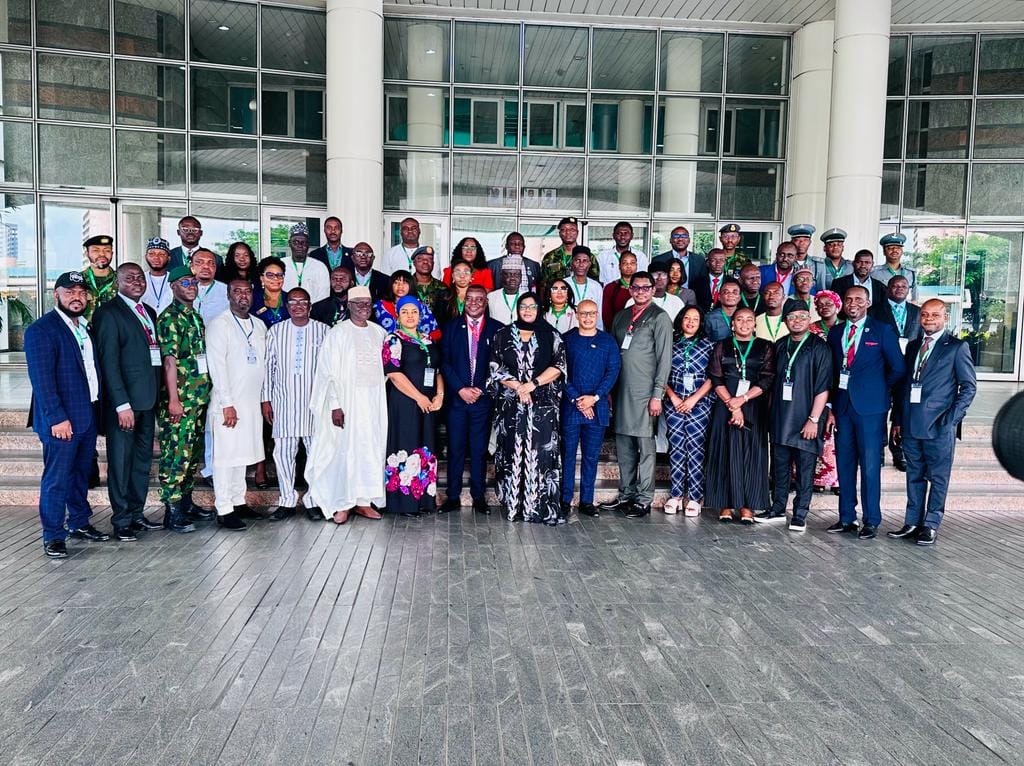
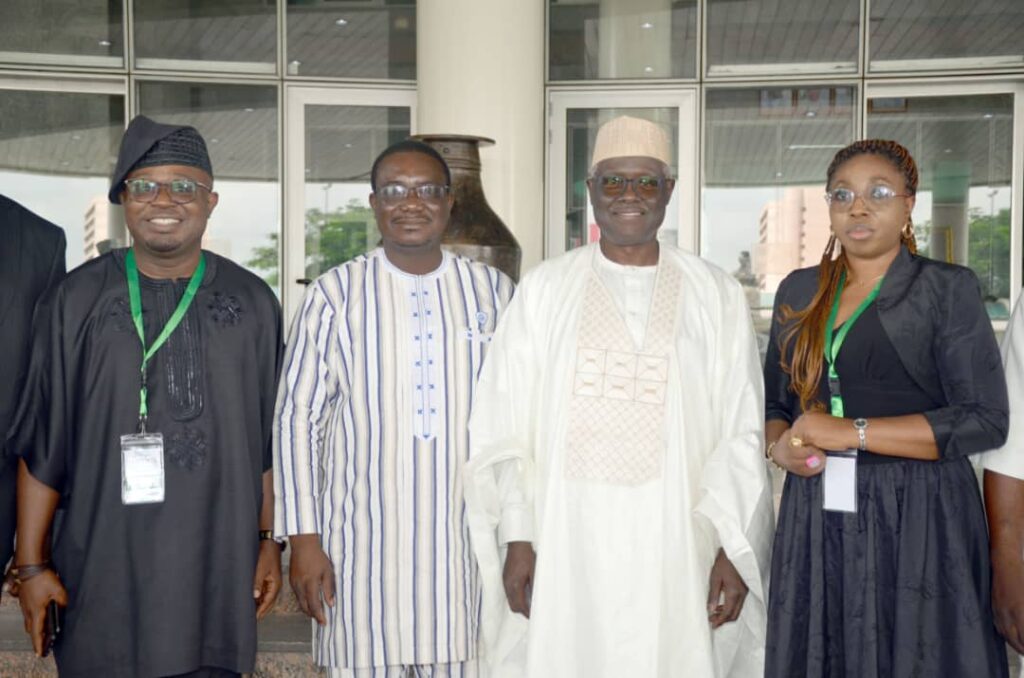
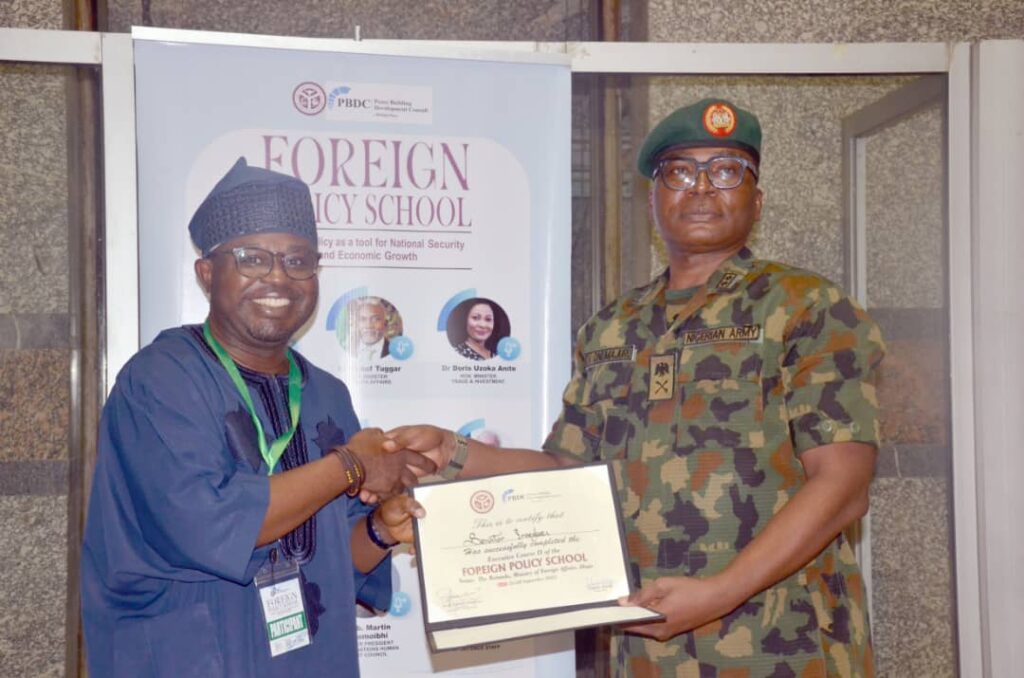
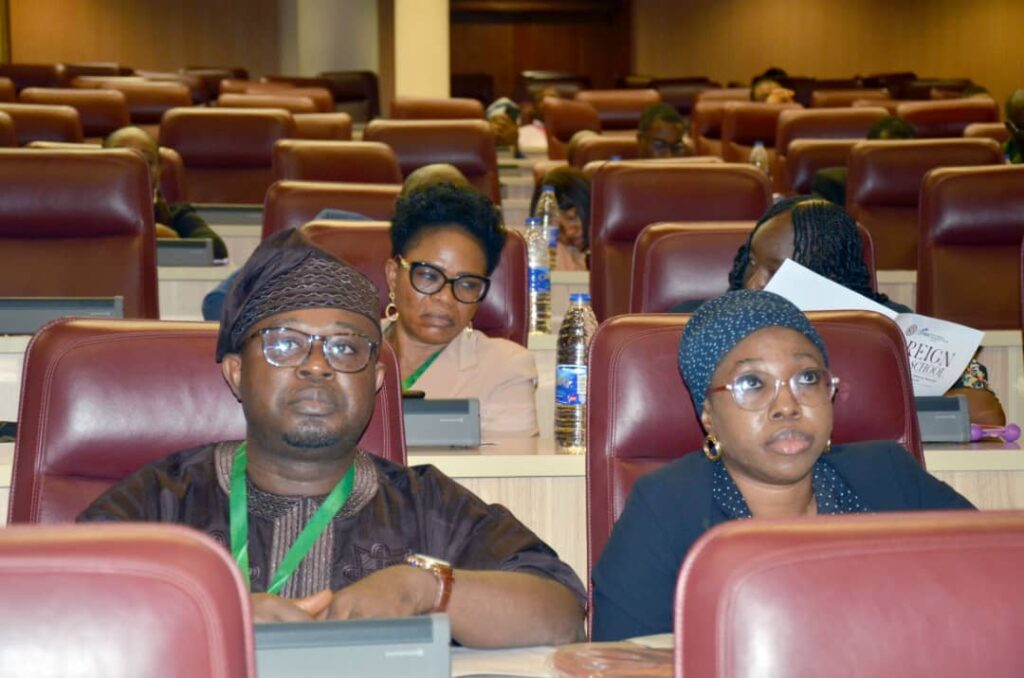
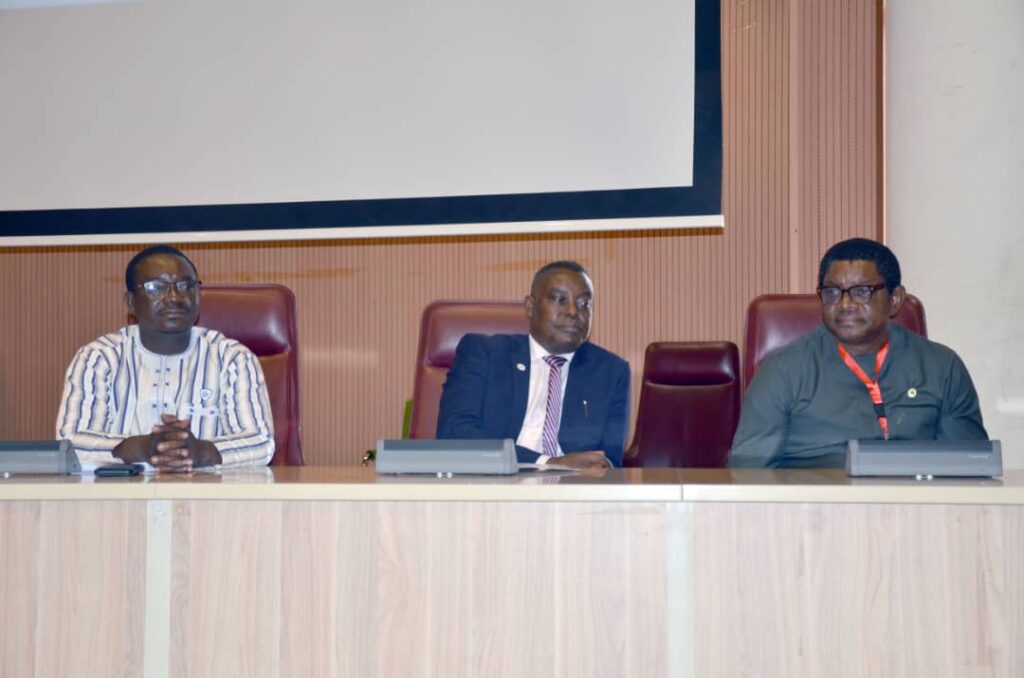
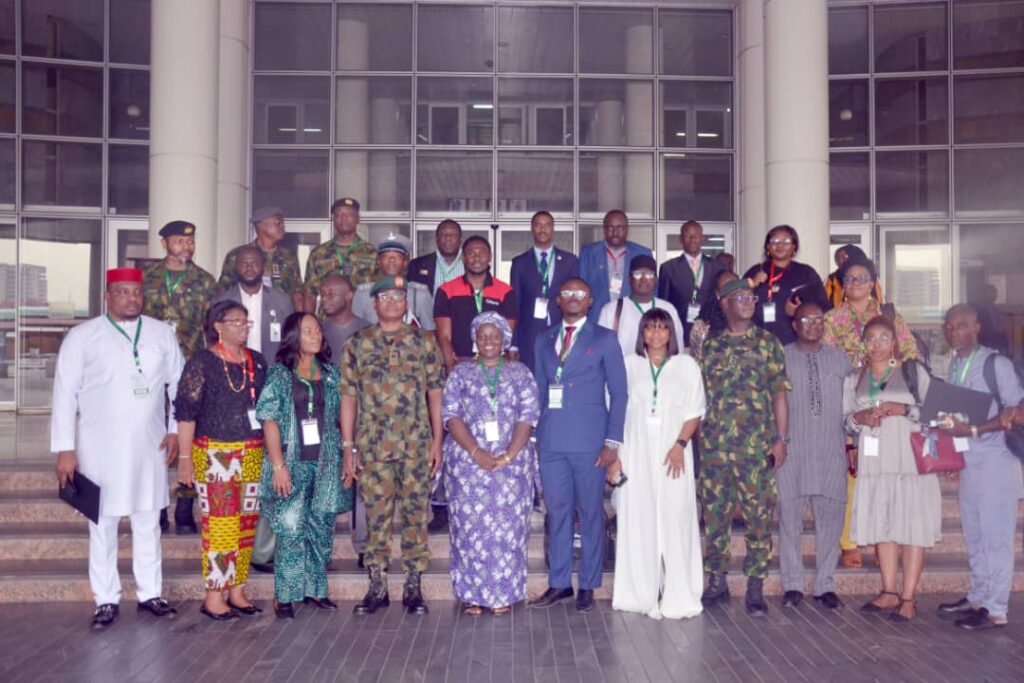
Accordingly, the Director General of the NIIA, Prof. Eghosa Osaghae, emphasised diplomacy’s pivotal role in international relations, linking the quality of diplomats and security agents’ training to Nigeria’s global standing. He stressed the necessity of continuous training, matching individuals ideally to their roles, and maintaining astuteness in responsibilities for effective diplomacy.
Osaghae stated, “The quality of our diplomats and security agents’ training determines our position in International Relations. Continuous training is imperative in the ever-evolving global stage. To keep pace, we must bridge the expertise gap by continuously relearning, rethinking, and reviewing what we thought we knew. In today’s world, individuals must perfectly fit their roles — a round peg in a round hole.”
Gen. Martin Luther Agwai (rtd), former Nigerian Chief of Defence Staff and Chief of Army Staff commended FPS for narrowing the gap between career and non-career diplomats. He stressed the importance of diverse voices and expertise in diplomacy, encouraging participants to act as ambassadors, safeguarding national interests, and fostering international friendships. Agwai, who was the chairman of the event, highlighted the significance of well-trained individuals in enhancing Nigeria’s global reputation and influence, especially during dynamic times, where training becomes an essential tool for diplomatic success.
“I am pleased to see the NIIA, through the Foreign Policy School, endeavouring to bridge the significant divide between career and non-career diplomats. As ambassadors of Nigeria, we must safeguard her national interests and cultivate friendships, both at home and abroad, to strengthen our global ties. With well-trained individuals, our nation can command the respect it deserves on the international stage,” he noted.
Insights from prominent figures, including Board Member of PBDC and former Director of Operations, Department of State Security Service (DSS), Mr. Raymond Ihenacho; and Chief of Defence Intelligence (CDI), Nigeria’s Defence Intelligence Agency (DIA), Maj-Gen. Emmanuel Undiandeye, affirmed the importance of professionally trained citizen diplomats championing the country’s foreign policy objectives. Discussions included the necessity for diplomats to possess requisite knowledge and experience, the role of military diplomacy, and the significance of effective trade negotiations.
Ihenacho stated, “All diplomats representing the country should have the requisite knowledge and experience.” He emphasised that participants, being diplomats, would inevitably defend the interests and image of the country, encouraging them to be as patriotic as possible to contribute to national betterment.
Representing the CDI, Air Vice Marshal (AVM) Samuel Chinda, discussed ‘Defence Diplomacy, Intelligence, and Security Governance in Nigerian Foreign Policy in the 21st Century.’ He underscored the role of military agreements in deterring adversaries and promoting commercial interest and proposed that DIA could enhance diplomatic engagement, addressing emerging security challenges through technological advancements and intelligence coordination.
“DIA could adopt strategies like bridging technological gaps, coordinating intelligence among agencies, and intensifying efforts to strengthen diplomatic engagement with foreign partners and international organisations in addressing emerging security challenges,” he added.
Rooted in multilateralism and global trade
The FPS key speakers also highlighted the cardinal points of Nigerian foreign policy, stressing its historical antecedents on multilateralism and global trade. Speaking on the topic: ‘Nigeria’s Foreign Policy: Theory, Practice, and Nobility’, the former President of the United Nations Human Rights Council, Amb. Martin Uhomoibhi, underlined the role of foreign policy in defining national ideals, values, intentions, interests, and aspirations, which properly position the disposition and temperaments of other nations and organisations to deal with her. He discussed the historical context of Nigeria’s Afrocentric foreign policy necessitating the nation’s role and tag as an “African Big Brother.”
Uhomoibhi stressed that “the thrust of Nigeria’s policy at independence was based on the universally accepted ideas of good neighbourliness’, morality, peaceful co-existence, justice, equity, respect, and friendship”.
Taking it further on the issue of friendship in the global arena, the Acting Director of Research and Studies, NIIA, Associate Professor Efem Ubi, while speaking on the topic: “International Relations and World Peace: Harnessing Multilateralism for Africa’s Benefit”, stated on the need to harness the benefits of multilateralism for Nigeria and Africa at large. He held that countries align or enter into agreements with international organisations to prevent conflict situations and withstand or fight global challenges due to the looming uncertain features facing the developing and developed world.
He said: ‘Due to the challenges of today, countries are seeking cooperation and interdependence to deal with mutual challenges, therefore multilateralism is not an option. For Africa to benefit from this cooperation they must understand and be able to negotiate well. Multilateralism is good but countries should be able to maximise its benefits to safeguard their future.”
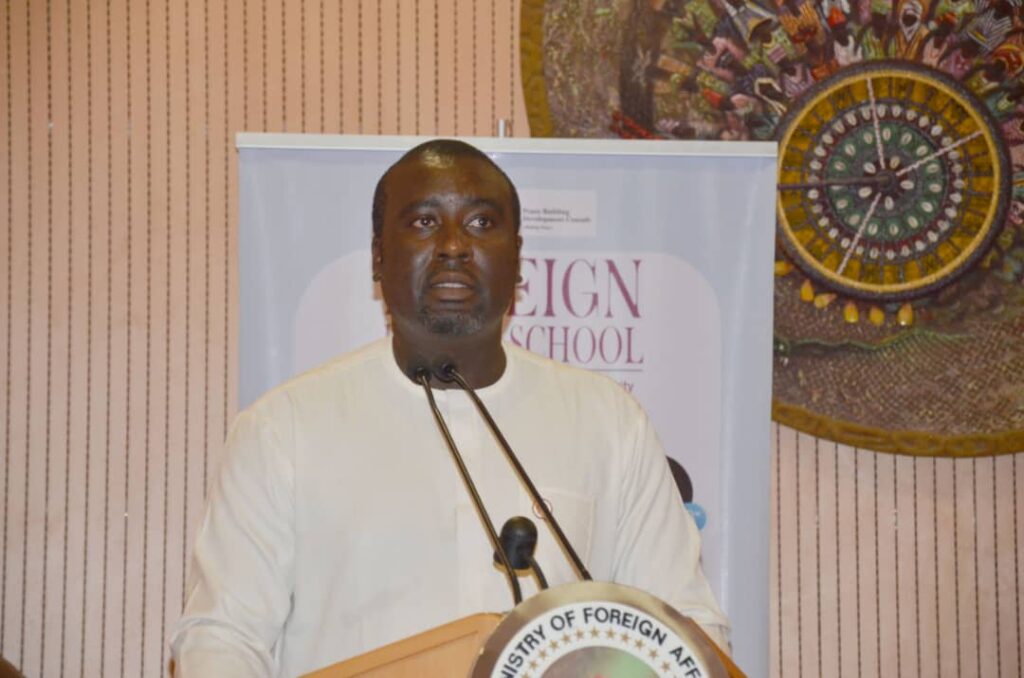
On his part, the High Commissioner of India to Nigeria, Benin, and ECOWAS, Amb. Shri G. Balasubramanian spoke on the “International Organisations, International Law and Negotiation’. He warned that the issues in today’s world are crossing boundaries and this calls for cooperation among nations to reach a course of action that would be accepted by all.
Balasubramanian harped on the need for a stronger involvement and role by regional organisations, in line with Article 52 of the UN Charter, in situations requiring peacekeeping and conflict resolution. He pointed out that recent moves in the Security Council to delegate responsibilities in peace-keeping matters to regional organisations are a reflection of a general mood towards more decentralisation of the international system, the need for reform and expansion in the membership of the Security Council so that it may acquire the legitimacy, authority and political and financial support necessary for the discharge of its expanding responsibilities, etc.
Backing the call for a sustained embrace of multilateralism, the Director-General/Chief Trade Negotiator, Nigerian Office for Trade Negotiations (NOTN), Amb. Fred Agah enlightened the participants about “International Trade Negotiations and Bargaining: Reexamining Nigeria’s Competitive Advantage”. He discussed some of the reasons why trade is important for Nigeria and other actors in the international system as it’s a great tool for economic growth and development, poverty reduction, source of income for countries with little or no natural resources, etc. This session was facilitated by the former Nigerian Ambassador to Ethiopia and Permanent Representative to the African Union, Amb. Nkoyo Toyo.
To effectively situate Nigeria’s competitive advantage, Agah called for a change in the country’s narrative from anti-trade and anti-negotiation to redefining the role of government in the economy, enhancing productive capacity, policy coherence, coordination, macroeconomic stability, etc. He started that “despite the economic challenges we are facing we need to look at trade as part of the solution, devise the best means of developing or creating new areas of growth, put our economy on a new trajectory of growth, and create more jobs for our youths; and also, public expenditure should be focused on enhancing competitiveness and productive capacity.”
Accordingly, Amb. Alexander Ajayi, who presented the topic: ‘Emerging Realities in Foreign Affairs. Diplomacy, Military power, and Political power”, on behalf of the Permanent Secretary Ministry of Foreign Affairs, Mr. Adamu Ibrahim Lamuwa, underlined the pressing issues facing Nigeria’s foreign policy, such as threats from bad governance, insecurity, and unconstitutional changes of government in the ECOWAS region and Africa, among others. He recommended a more assertive foreign policy to tackle these emerging challenges.
He said: “There is a need for Nigeria’s foreign policy to reassert itself and command the needed compliance by ensuring that the following recommendations are put into practice including that the ECOWAS mediatory role should be intensified with the needed support from Nigeria, diplomacy of aid assistance, and establishment of a peer review framework to check or call erring political leaders to order.”
Conclusion: Shaping Nigeria’s global presence
The 2nd edition of the Foreign Policy School (FPS 2.0) provided invaluable insights into the crucial role of diplomacy and the significance of training in molding Nigeria’s global standing. The event facilitated discussions among diverse participants, emphasising the dynamic nature of international relations and underscoring the pivotal roles of citizen diplomacy and multilateral organisations.
Director-General of NIIA, Prof. Eghosa Osaghae, highlighted these key points in his presentation, “Understanding International Relations and Global Diplomacy.” Osaghae reiterated the influence of multilateral organisations as rule-harbingers in the international system. He underlined the efficacy of citizen-to-citizen diplomacy, identifying it as a potent means of showcasing emerging influence through education, culture, sports, cuisine, etc. This form of diplomacy, he noted, allows for a non-violent or hegemonic display of power. “Diplomacy is a subtle act of domination or psychological warfare,” he stated, urging participants to grasp these nuances to become effective diplomats.
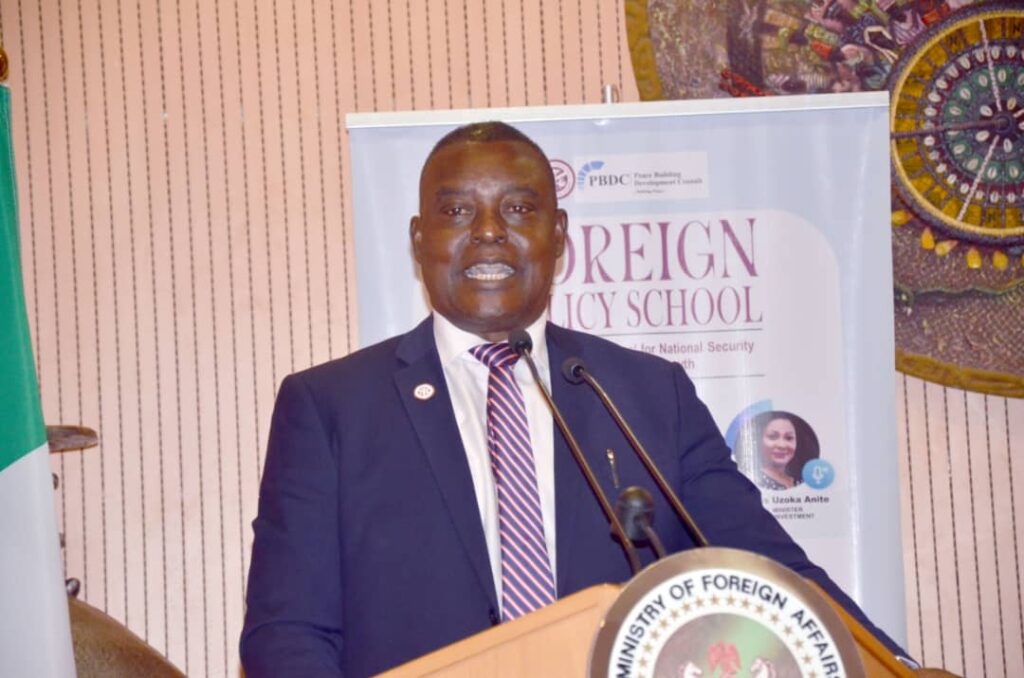
Key takeaways
- Diplomatic Recalibration: FPS 2.0 emphasised the need for a recalibration of Nigeria’s foreign policy, calling for a shift-not totally abandoning the historical Afrocentric approach-but to a more globally relevant strategy.
- Citizen-Centric Diplomacy: The School highlighted the importance of a “whole society” approach, focusing on citizen-centric diplomacy. This approach incorporates the Tinubu Doctrine’s 4-D Diplomacy (Democracy, Demography, Development, and Diaspora) for intentional and dynamic foreign relations.
- Professionalism in Diplomacy: Stakeholders underscored the crucial role of well-trained diplomats across government agencies, extending beyond foreign affairs. The emphasis was on the significance of skilled diplomats in areas such as aviation and investment.
- Clear Guidelines for Diplomat Appointments: Former President Goodluck Jonathan stressed the need for clear guidelines in appointing non-career diplomats, ensuring selection based on qualifications rather than political considerations.
- Multilateralism Embrace: The conference backed a sustained embrace of multilateralism, recognising its benefits in dealing with global challenges. The importance of understanding and negotiating effectively within international organisations was emphasised.
Recommendations
- Structured Guidelines: Implement structured guidelines for appointing diplomats, ensuring a merit-based approach that selects individuals based on qualifications and expertise.
- Continuous Training: Prioritise continuous training for diplomats and security agents to keep pace with the evolving global stage. This ensures that individuals are well-equipped for their roles in international relations.
- Citizen-Focused Strategy: Implement a citizen-focused and citizen-enabled strategy, recognising the collective efforts of citizens, both in public and private spheres, academia, and civil society, in advancing foreign policy objectives.
- 4-D Diplomacy Implementation: Actively implement the Tinubu Doctrine’s 4-D Diplomacy, aligning foreign policy with national interests, democratic values, demographic potential, economic development, and diaspora welfare.
- Diverse Voices in Diplomacy: Acknowledge the importance of diverse voices and expertise in diplomacy. Bridge the gap between career and non-career diplomats, encouraging a variety of perspectives to enhance Nigeria’s global reputation.
- Assertive Foreign Policy: Recognise the pressing issues facing Nigeria’s foreign policy, such as threats from bad governance and insecurity. Implement an assertive foreign policy, intensifying ECOWAS mediatory roles and establishing frameworks for peer review.
- Strategic Approach to Appointing Diplomats: Develop a strategic approach to appointing diplomats, ensuring that individuals are ideally suited for their roles, thereby enhancing efficiency and effectiveness in achieving national goals.
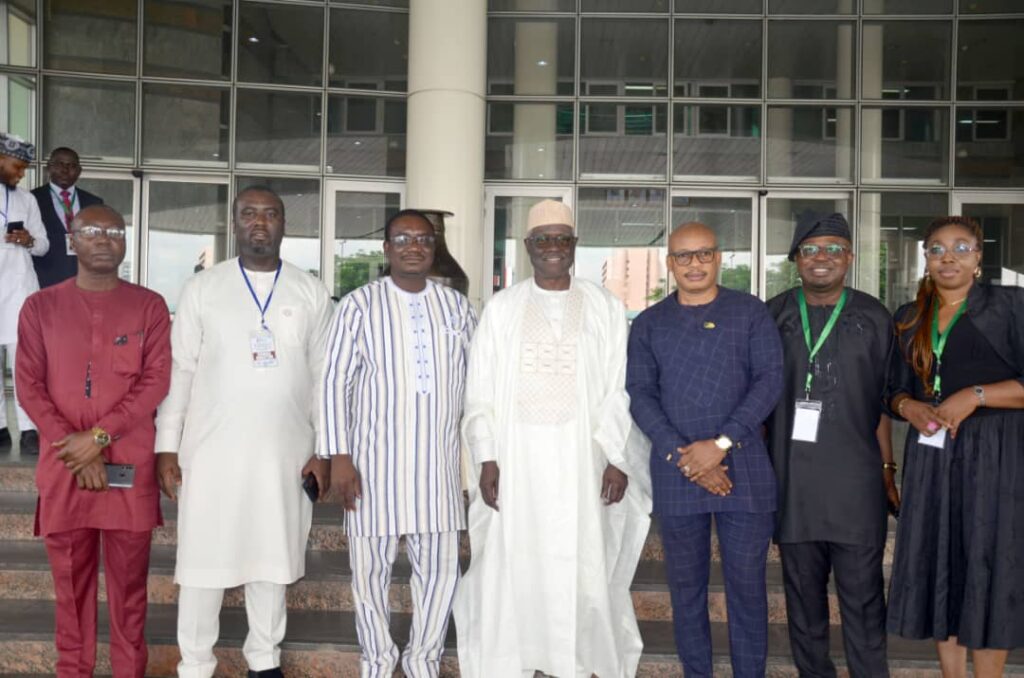
2nd from left: Kayode Bolaji; Amb. Gouba; Gen. Agwai (rtd); Acting Director of Research and Studies, NIIA, Associate Professor Efem Ubi; Senator Iroegbu; and Chioma Emma
By embracing these takeaways and recommendations, Nigeria can strategically position itself on the global stage, fostering stronger diplomatic ties, adapting to the ever-changing dynamics of international relations, and promoting its interests effectively.
More importantly, the recommendations stemming from this event accentuated the importance of structured guidelines, continuous training, and a strategic approach to appointing diplomats tailored for their roles. Implementing these suggestions can enhance Nigeria’s diplomatic efforts and strengthen its presence on the global stage. In essence, FPS 2.0 has reaffirmed the critical role of diplomacy and citizen diplomacy in defining Nigeria’s position in Africa and the world.

